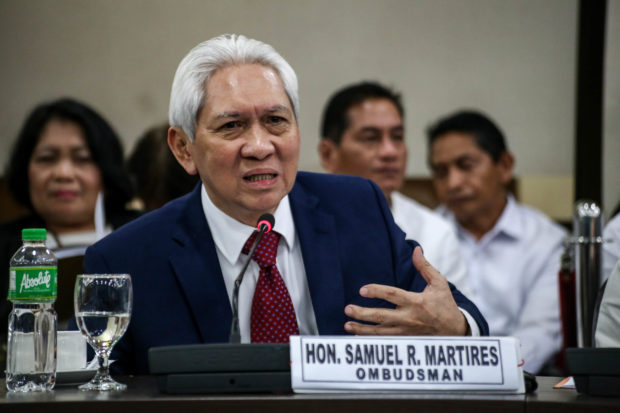
Ombudsman Samuel Martires.INQUIRER FILE PHOTO/ JAM STA ROSA
MANILA, Philippines — Ombudsman Samuel Martires remained adamant that he is not blocking transparency by placing restrictions on the release of public officials’ Statement of Assets, Liabilities, and Net Worth (SALN), as he believes that transparency does not mean showing one’s entire guts out.
Martires on Tuesday was asked whether the Office of the Ombudsman was forging a possible conflict of interest issue as the decision on the publication of SALNs — documents meant to provide the public a look into the wealth transactions of a government employee — rests on the person filing it.
In reply, he told CNN Philippines’ The Source that he is not restricting transparency, and that he is just observing jurisprudence based on Supreme Court (SC) issuances.
“I think on the issue of transparency, I don’t think that transparency means that pati loob ng bituka mo ilabas mo. I am not restricting transparency, I am just following doctrinal rulings of the Supreme Court,” Martires explained.
“I did not say this, that the right of access to information is subject to regulations, I did not say this, this is a jurisprudence of the Supreme Court. In fact in 2012, the Supreme Court issued its own guidelines on how to access the SALN of justices and judges,” he added.
According to Martires, the Supreme Court — considered to be the last bastion of democracy — even placed restrictions on SALN releases.
“In 2019, it expanded I guess its guidelines on how to access the SALNs of justices and judges. So hindi ho kami ang nagrerestrict lang eh. Even the judiciary, even the last bastion of democracy which is the Supreme Court is putting some restrictions because the Supreme Court said, this is subject to regulations,” he said.
Aside from these, the Ombudsman also referred to past SC resolutions that denied access to SALNs — noting that these in itself, are already regulations on access to SALNs.
“I made further research, I found that in 1989, the Supreme Court issued a resolution when somebody was trying to access the SALN of a judge, the Supreme Court said you first state the purpose of your request. That is a regulation,” Martires noted.
“In 1992 […] the Supreme Court again issued a resolution prohibiting the Office of the Ombudsman, who was requesting for the SALN of a judge and the Supreme Court said no, ‘your request partakes the nature of a fishing expedition, and the request is not signed by the Ombudsman itself’. So this is a policy regulation,” he added.
Earlier, Martires was asked in the same interview why he is being singled out for wanting regulations on who can obtain SALNs, and for what purpose, when government agencies acting as custodians of these documents are doing the same.
The Ombudsman has been advocating for the amendment of Republic Act No 6713 or the Code of Conduct and Ethical Standards for Public Officials and Employees, by stressing that SALNs can only be published for public information and not for commentary.
Under Martires’ proposal, making commentaries on the SALN of public official can be punishable by jail term of at least five years.
Last October 19, Martires allayed the fears stated in a Philippine Center for Investigative Journalism (PCIJ) report titled “Ombudsman’s draft bill to amend SALN law raises more red flags,” which highlights the draft amendment being pursued by Martires.
READ: Martires dispels worries about SALN law revisions: No major changes, it’s just for clarity
The possible amendments to R.A. No. 6713 were first raised by Martires during the House hearing of his office’s budget last September 9.
He said that even he been a victim of malicious reportage, as media outfits reported and allegedly made commentaries on his SALN — implying that he earned P15 million in three months without clarifying matters with him in the first place.
READ: Martires wants jail term for people commenting on gov’t officials’ SALN

